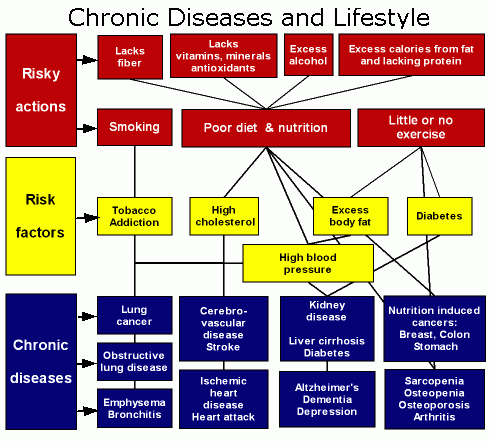|
Prevent or Control Chronic Disease Without DrugsWhat is Chronic Disease?"Chronic diseases—such as heart disease, cancer, and diabetes—are the leading causes of death and disability in the United States. These diseases account for 7 of every 10 deaths and affect the quality of life of 90 million Americans. Although chronic diseases are among the most common and costly health problems, they are also among the most preventable. Adopting healthy behaviors such as eating nutritious foods, being physically active, and avoiding tobacco use can prevent or control the devastating effects of these diseases." Chronic disease, US National Center for Disease Control.
Medical TreatmentMedical treatment may provide relief from chronic disease for many years, but properly prescribed medication is the fourth-leading cause of death in the United States, (J. Lazarou, B. Pomeranz, and P. Corey. Incidence of adverse drug reactions in hospitalized patients, Journal of the American Medical Association, 279 (1998) 1200-05.) Surgery is commonly used for heart disease and cancer, but may have to be repeated, each time exposing the patient to risk.Medical treatments may appear to be the only option for treating chronic disease, but medical treatments should be recognized for what they are: interventions that are often as risky as chronic disease. Genes and Chronic DiseaseMany chronic diseases run in families, indicating that genes cause specific diseases such as heart disease and diabetes. Some people believe that gene therapy will open new avenues of treatment. Others believe that fate determines who gets chronic disease and who does not. Still others believe that fate only "deals the cards"—what counts is how you play the game.Lifestyle and DiseaseLifestyle is about "how to play the game" given the "cards" we are dealt at birth—the genes. This is the old debate about "nature or nurture", where genes determine our "Nature" and upbringing determines our "Nurture". When we think about it, most of nurture seems to be just as determined as genes. The "accident of birth" determines whether the shop on the corner is more likely to sell Kentucky Fried Chicken or insalata di pescatore. People in developed countries are born into rich societies with motor transport, refined food and pollution—all of which have been associated with chronic disease.Life is not so refined everywhere, though developing countries are catching up. Life has not been so refined for very long either, perhaps only in the last 75 years. In olden days and in many parts of the world today, the main causes of death were and still are: infections, accidents, natural disasters, wars and violent crime. Acute diseases and traumatic conditions are what doctors have been trained to cure and they have been quite successful doing so. What has happened to us in the modern world is something new. People now live long enough for their lifestyles to affect not only the length of life, but also the quality of life. One cancer death in three can be shown to be linked to at least one of nine risk factors, according to scientists at the Harvard School of Public Health. "Primary prevention through lifestyle and environmental interventions remains the main way to reduce the burden of cancers.... Smoking, alcohol use, and low fruit and vegetable intake were the leading risk factors for death from cancer worldwide and in low-and-middle-income countries. In high-income countries, smoking, alcohol use, and overweight and obesity were the most important causes of cancer. Sexual transmission of human papilloma virus is a leading risk factor for cervical cancer in women in low-and-middle-income countries." Causes of cancer in the world.If we can reduce risk of cancer by exercise and diet, how much more will we be able to reduce risk of other diseases—heart disease and diabetes—also influenced by diet and exercise. "But I Prefer to Have a Short Life"We have all heard this absurd objection to a healthy lifestyle, "I know I am not going to stay healthy, but I don't want a long life anyway." Make no mistake about it: unless you live in Oregon or the Netherlands, you cannot choose to go when chronic disease becomes unbearable. The only thing that most of us can influence is the quality of life. And for most of us as we age, we can improve quality of life by choosing to stay free from chronic disease. We can choose:
|



